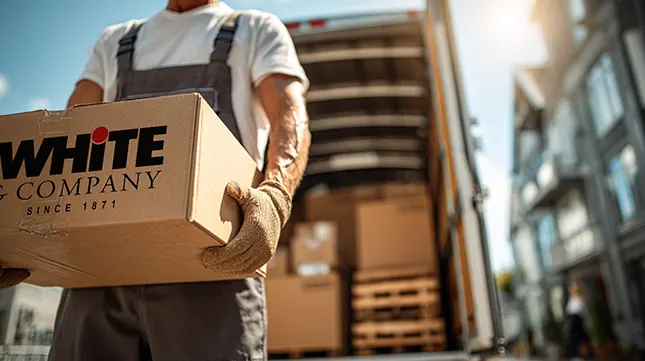Top 12 Most Common Pitfalls When Moving House and How to Avoid Them

Are you about to move home? Moving house is often described as one of life’s most stressful events, comparable even to divorce!
It can be a hotbed of disappointments, such as a house sale falling through or damage to your belongings, not to mention the hard work of packing and preparing everything ready to transport to the new property.
However, it doesn’t have to be; there are strategies and help available to make the whole process easier.
The key lies in preparation, organisation, and knowing what to expect. Too many people underestimate the time, effort, and logistics involved, falling into the same traps that turn moving day into a nightmare.
From last-minute packing to underestimating the amount of belongings you own, these mistakes are incredibly common.
The good news? With the right approach, they’re completely avoidable.
In this guide, we’ll walk you through the 12 most common pitfalls when moving house in 2025 and show you how to avoid them, saving time, money, and plenty of stress along the way.
1. Why Moving Day Feels Like Chaos (And How to Stop It Before It Starts)

Avoid last-minute stress by planning at least eight weeks in advance and using a clear moving checklist.
Most people underestimate the amount of work involved in moving house.
Leaving everything to the last week absolutely guarantees stress, forgotten jobs, and late-night packing.
A simple moving checklist can save the day.
Start planning at least eight weeks ahead: book your removal company, organise utilities, and create a packing timeline.
White & Company, for instance, provide pre-move surveys to spot issues before moving day.
Don’t just wing it; it is a sure-fire route to disaster.
Get your plan down on paper.
For extra guidance, White & Company have produced a very helpful moving home checklist blog, which is a solid starting point.
2. Space & Measurement Disasters

Why Moving Day Feels Like Chaos (And How to Stop It Before It Starts)
A surprisingly common mistake is assuming furniture will “just fit,” whether it is getting it out of your old home or into your new one.
Sofas stuck in hallways, wardrobes that won’t clear staircases, or fridges too wide for the kitchen door cause major headaches on the day.
Avoid this by measuring everything, both your furniture and the access points in your new home.
Removal companies can dismantle and reassemble large items, but only if they know in advance.
Pro tip: take photos of tricky angles and share them during your removal survey. You’ll thank yourself later.
3. Arrange Insurance Cover for your Belongings

Protect your possessions by arranging proper removals insurance before moving day.
When you are moving home, it is good to know that should there be any damage, you can actually be reimbursed for it.
Some home insurance policies can cover house moves, but many don’t. It is essential to inquire with your pre-move surveyor about the way of insurance and how they work.
Accidents are rare, but they can happen, which is why having the right cover in place is essential.
White & Company offer MoveProtect, a flexible liability cover that lets you declare the full replacement value of your goods, rather than relying on a basic cap.
That means peace of mind knowing your belongings are appropriately protected from start to finish.
4. Decluttering Before the Move

Save time and money by donating, selling, or recycling unwanted items before packing.
This is always good advice. Why pay to move things you don’t need?
Decluttering well before packing and certainly before you book a pre-move survey, not only reduces removal costs but also makes settling into your new home easier.
Be ruthless: donate, sell, or recycle items you haven’t used in years.
Charities like British Heart Foundation even collect furniture for free. For everything else, plan a trip to your local recycling centre.
Downsizing your belongings before moving day is one of the most effective ways to cut stress (and save money).
5. Packing: Materials, Timing, Strategy

Use sturdy materials, pack early, and label boxes clearly to avoid damage and confusion.
This is another area that is often overlooked.
Bad packing causes more damage than the move itself. Using flimsy boxes, mixing heavy and fragile items, or packing at the last minute are recipes for disaster.
Invest in sturdy, double-walled boxes, bubble wrap, and strong tape.
Start with non-essentials weeks in advance and always label boxes clearly with contents and destination room.
White & Company offer professional packing services if you’d rather skip the hassle altogether.
We will bring boxes, protective coverings for your larger items, tissue paper for the fragile ones and strong, eco-friendly boxes.
For DIY packers, the Custom Boxes guide to packing materials can help you choose eco-friendly supplies.
6. Fragile Items: Protecting Your Valuables
It’s heartbreaking when sentimental or expensive items break in transit.
Although sometimes it is impossible to avoid damage completely, even with the most careful packing, ensuring your fragile goods are packed with extra care goes a long way to minimising potential breakages.
Wrap glass, ceramics, and electronics individually, pad boxes with newspaper or bubble wrap, and clearly mark them as “fragile.”
Consider carrying personal valuable treasures such as jewellery, passports, and family heirlooms yourself.
If you’ve got fine art, antiques, or specialist equipment, ask your removal company about bespoke crates or export wrapping.
White & Company are part of FIDI, meaning they meet international packing standards for delicate shipments.
Plus, at White & Company, when it comes to highly valuable pieces, we can arrange custom-built crates to transport your most prized possessions safely.
7. Access & Logistics: Staircases, Doors, Routes

Plan for parking, narrow staircases, or tricky entrances to keep your move running smoothly.
Even the best packing is useless if movers can’t access your property.
Narrow or spiral staircases, parking restrictions, or blocked entrances can delay everything.
Speak to your removal company about access in advance (again, the pre-move survey will highlight any potential issues).
Councils can often issue temporary parking permits; check your local authority’s website. A removal company cannot park just anywhere, and not having official parking in place can be a disaster on move day.
Clear driveways and pathways before the big day, and it is polite to let neighbours know if a large van will be temporarily parking outside or close to their home.
These little steps make a huge difference to a smooth move.
At your new home, it is also a good idea to introduce yourself to your closest neighbours and apologise in advance for any inconvenience or impact your move may have on them.
Plus, it is a perfect opportunity to introduce yourselves!
8. Timing & Scheduling: Things You Must Book Early

Secure your removals slot, redirect post, and book utilities ahead of time to avoid delays.
Another big pitfall, and surprisingly common, is leaving key arrangements too late.
Removal companies, cleaners, and even broadband installations get booked up quickly, especially in summer.
Aim to confirm your removal slot as soon as your moving date is set.
Reputable removal companies are always at their busiest during the summer months, and securing late bookings can be challenging. School holiday moves ensure that children can start a new school at the beginning of a new year.
Redirecting your post via Royal Mail and updating addresses with banks, GP surgeries, and schools should also be high on your list.
Missing deadlines can leave you without internet, TV, or even mail delivery for weeks after moving in.
9. Cleaning, Utilities & Admin: Don’t Get Stuck Without the Basics

Arrange utilities, take meter readings, and book cleaners so your new home is move-in ready.
Unfortunately, things don’t slow down on the move day itself, even if you have been well organised beforehand.
On moving day, the last thing you want is to arrive at a dusty home with no water, gas, or electricity.
Arrange meter readings at both properties (take a photo of each) and set up your utility accounts in advance.
The Citizens Advice guide to energy supply explains your rights if anything goes wrong.
And don’t forget bins, check your new council’s collection days to avoid piling up rubbish in your first week.
It’s also worth booking professional cleaners to freshen up before you move into your new home.
Although it is etiquette to clean your old property, many don’t and arrive to find a total mess to work through before you can begin the unloading of your belongings.
10. Departure Surprises: Leftover Stuff, Hidden Costs
A common pitfall is forgetting to empty lofts, garages, or garden sheds.
Come moving day, you’ll suddenly find whole areas still full of belongings.
Do a thorough sweep of every storage space at least a week before.
Also, budget for hidden extras, parking fines, childcare, pet boarding, or last-minute takeaway dinners, as they add up fast.
Moving house almost always costs more than expected, so set aside a buffer fund to cover surprises.
11. The Moving Company: Picking Right and Making Them Work for You

Choose a BAR-accredited removals company and communicate clearly with the team on moving day.
Not all movers are equal. Hiring the cheapest option often means poor service or hidden fees.
Instead, choose a company with professional accreditation. White & Company, for example, is a member of The British Association of Removers BAR, ensuring quality and consumer protection.
Ask for a written quote, check reviews, and confirm what’s included (packing, insurance cover, dismantling, storage).
Ensure that anything you want to take with you, such as valuables and passports (for European and international moves), is safely out of reach of the removal team.
On moving day, keep communication clear. A quick walk-through with the crew avoids misunderstandings and keeps everything running smoothly.
12. Settling In: What to Do Once You Arrive

The Moving Company Picking Right and Making Them Work for You
After the chaos of moving day, it’s tempting to just collapse among the boxes.
But tackling a few key jobs first will make your new home feel welcoming.
Prioritise setting up beds, unpacking kitchen essentials, and checking security (locks, alarms, smoke detectors).
Introduce yourself to neighbours early — they’re a great source of local info.
Finally, explore your area: Importantly, locate GP surgeries, and register with local services.
Settling in quickly helps turn your new house into a home.
Moving With the Help of White & Company

Moving house will always be a big job, but avoiding these common pitfalls makes it far less stressful for all concerned.
As previously stated, starting the process early, planning carefully, and working with a trusted removal company is the difference between success and failure.
White & Company have been helping families relocate for over 150 years, offering everything from packing to storage, European and international shipping.
With the right support, your next move can be smooth, efficient, and even, dare we say it, enjoyable!
Give us a call and get the ball rolling; you will be glad you did.

Max is a seasoned writer and blogger in the real estate and home moving sectors, as well as a knowledgeable source of information for expatriates living and working abroad. His detailed insights have helped thousands of people move and live abroad with greater simplicity and ease.
Posted in: News
Leave a Comment (0) ↓


